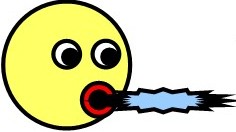On the cover of the paperback version of the book is a modified version of the Author's Note by Krakauer that prefaces the book:
In April 1992, a young man from a well-to-do family hitchhiked to Alaska and walked alone into the wilderness north of Mt. McKinley. His name was Christopher Johnson McCandless. He had given $25,000 in savings to charity, abandoned his car and most of his possessions, burned all of the cash in his wallet, and invented a whole new life for himself. Four months later, his decomposed body was found by a moose hunter...That paints the life and fate of Chris McCandless in broad brush strokes, but it's a jumping-off point for the book. Krakauer came into the story when his editor at Outside magazine had him write an article about McCandless, which drew a very strong response from the magazine's readers. Most of it was quite critical of McCandless, saying that his idealistic naivety and his arrogant hubris in not preparing properly for his wilderness adventure cost him his life. There is a certain amount of truth in that characterization, but McCandless was certainly a more complex person than that would have you believe. And as Krakauer explains, his story is unusual but not unique. Other young men have felt the urge to cast off the trappings of bourgeois society, abandon their old lives and head west to seek a new life, to commune more closely with Nature, or to become really, completely free.
Freedom is a complex concept, however, and it is closely linked with security. Indeed, you could draw a continuum between absolute freedom and absolute security, and the lives that most of us live fall somewhere between the two absolutes. Absolute freedom means being beholden to no one, owing nobody anything, being able to get up and leave at any time, to take off and do anything you choose to do. Most of us can't do that: We have mortgages, car payments, apartment leases, utility bills, property tax bills, insurance payments, college loan payments, jobs, families, pets, the mundane web of life that ties us down.
The more security you have, the less freedom you have. The more things you own, the more those things own you. When was the last time that you owed nobody anything and could freely have gone anywhere and done anything you wanted?
McCandless understood this, and wanted to be free rather than secure. He graduated from college at Emory University in Atlanta, with honors, but without owing any money for his education. He felt estranged from his parents, due to certain incidents from his childhood, and wanted nothing more than to be free to seek transcendent experiences in nature. He took on a new name for his travels, Alexander Supertramp, drove west in his old Datsun (whose registration had expired) and sought to live off the land as much as possible. It was a romantic, nomadic existence on the margins of American society. He was not alone there, of course; there were others who had fallen through the cracks and didn't share the bourgeois American dream that most of us have. McCandless was different from most of them in that he had chosen his lifestyle. He was college-educated, after all, and could have gone down the 9-to-5 career path if he had wanted to do so, but he did not.
Absolute freedom, or any close facsimile thereof, is by definition an insecure existence. That kind of freedom means traveling with only what you can carry on your back at a dead run, as McCandless's sister described him. Being a hunter-gatherer is a precarious lifestyle. You don't know where your next meal is coming from, and indeed, you may miss a meal or two, or a whole lot of them. McCandless wasn't the first to starve to death in Alaska. And anyone who has a Disney perception of Nature (capital N) as kind and benevolent is a starry-eyed, naive idealist. Nature is pitiless and cruel, and has no special love for Mankind. That you eat regularly is not due to Nature's kindness, but to the fact that you live in an area where Nature has been tamed, where Mankind has turned the Earth to his own uses. Very few of us have ever set foot in real wilderness, and even fewer of us could survive there for very long.
As Krakauer notes, the fatal mistakes that McCandless made in his final journey into the Alaska wilderness were taking insufficient supplies, not bringing a USGS topographic map (which would have shown him an escape route a few miles away after the raging Teklanika River in summer flood trapped him on the wrong side), and not having sufficient knowledge of the local flora and ending up starving to death from apparent alkaloid poisoning by eating the seeds of the wild potato, which prevented his body from properly digesting food. He had a guidebook which warned against eating wild peas, which looked similar to wild potato seeds, but said nothing specifically about the latter.
There is a little bit of McCandless in most of us, that wants to cast off the fetters of our day-to-day existence, take off running and see what's over the far horizon. Few of us ever do it, of course, just as few people perform highwire acts without a net. If he had lived a little longer, perhaps he would have grown up, matured to the point where he would have returned to become a productive member of society. Then again, a bison running freely across the plain is ill-suited to become an ox in harness. After you've tasted true feedom, can you ever really come back? Most of us will never know.

